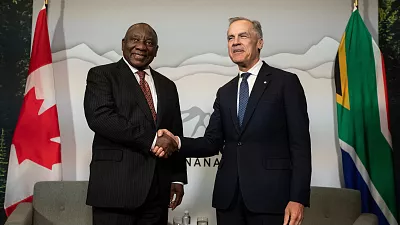South African President Cyril Ramaphosa arrived in Calgary on Sunday, where he was greeted by a delegation ahead of the Group of Seven (G7) summit. The high-profile gathering of world leaders is set to take place in the picturesque mountain resort of Kananaskis, located deep within the Canadian Rockies.
The summit, which brings together the heads of the world’s leading economies, opens amid a tense international climate. Key global issues, including rising hostilities between Israel and Iran, and the continuing fallout from U.S. President Donald Trump’s trade confrontations with both allies and adversaries, are expected to dominate discussions. The conflict in Ukraine will also be a central topic, reflecting the summit’s growing focus on global security and stability.
Ukrainian President Volodymyr Zelenskyy is among the key figures attending the talks and is scheduled to meet with Trump. The upcoming encounter between the two leaders follows a previously fraught Oval Office meeting that drew international attention due to its openly confrontational tone and the diplomatic uncertainty it sparked. Observers will be watching closely to see whether this reunion signals a shift in tone or a continuation of strained relations.
On the summit’s sidelines, President Ramaphosa is expected to hold a bilateral meeting with President Trump — their first since a controversial White House exchange in May. During that visit, Trump reportedly pressed Ramaphosa over unsubstantiated claims of violence targeting white South Africans, a topic that drew criticism for its inflammatory nature and lack of supporting evidence. The upcoming discussion is anticipated to be a more measured diplomatic engagement, offering both leaders a chance to recalibrate their relationship.
As the G7 convenes, the leaders face mounting pressure to demonstrate unity in addressing not only geopolitical tensions but also broader economic and security challenges. Ramaphosa’s participation signals South Africa’s continued engagement with global economic powers and its interest in shaping responses to issues with far-reaching consequences.



